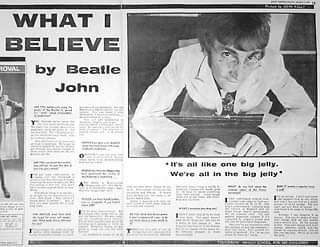In 1967 John Lennon gave an exclusive interview to The Daily Sketch which was published in their October 9th edition.
Entitled 'What I Believe - by Beatle John,' the interview focused on the changing attitudes of the late-sixties, flower power and the Beatles' spiritual endeavors with the Maharishi. The paper's conservative slant can be gently felt in the tone of the questions as Lennon is asked about the religious implications of their new eastern interests, and what role it all plays in context with LSD, fame, and Christianity.
Following this interview, after spending time with the Maharishi in Rishikesh in 1968, the group began to denounce, specifically, following the Yogi. What had NOT changed however was that the Beatles still believed strongly that meditation and eastern spiritualism were both beneficial and life-transforming.
The Daily Sketch newspaper was founded in 1909 and was considered Britain's oldest tabloid when its final issue hit the streets in 1971.
John Lennon is interviewed by Daily Sketch columnist Anne Nightingale. The photographer for the interview is John Kelly.
- Jay Spangler, www.beatlesinterviews.org
Q: "Are you deliberately using the power of the Beatles to spread the word about transcendental meditation?"
JOHN: "Yes, because we've never felt like this about anything else. We want the younger generation, especially, to know about it. It's for everyone. For 'householders' as the Maharishi calls them. Just for ordinary people. You don't have to be some sort of freak to meditate. We've got to convince people we are not mystic... get through our million images to show people that what we can do, anyone can do."
Q: "Are you convinced that meditation will last your life, that it won't be just a phase?"
JOHN: "I've got some reservations, of course, but I'm convinced it works in the way they say it works. There's a lot more to learn yet. But I'm willing to find out. You don't have to have a great faith or anything. The whole thing is so simple - as though it's too marvelous to be true. You think: 'Why haven't I heard about it before?' But in fact, it's been around for a long, long time."
Q: "The Beatles must have been the target for every cult imaginable. What made this so different for you?"
JOHN: "It was always the same package before - Billy Graham stuff. Of course everyone's trying to reach the same thing ultimately. But the Maharishi's way is natural, not unnatural. You can make it with meditation if you're a Christian, a Mohammedan or a Jew. You just add meditation to whatever religion you've got. It runs alongside Christianity amazingly. Re-read it now, you know, what it's about. The kingdom of heaven within you. It IS within you."
Q: "People have been a bit doubtful about the moral issues with transcendental meditation..."
JOHN: "Obviously you put your own code of ethics into it. No one really wants to go around killing and having orgies."
Q: "People like Malcolm Muggeridge have questioned the validity of the Maharishi's meditation..."
JOHN: "And where is Malcolm Muggeridge at? The Maharishi is a completely happy man. Malcolm Muggeridge isn't."
Q: "Would you have found meditation so acceptable if you hadn't taken LSD?"
JOHN: "It's all been misconstrued. We dropped LSD weeks before we met the Maharishi. We were looking for something more natural. But all that has been said about us building gold palaces in India is rubbish. Everyone thinks we are going to freak out into the hills forever! All meditation means to us is that we have more output in our work. More energy for things like recording and filming. It would have worked just the same if we hadn't taken LSD."
Q: "Do you think that flower power is just a commercial craze, or do you think there is some worth to it?"
JOHN: "There will be a sort of core of things that will come out of it which will be worthwhile. Just the love and peace thing is worth it, whatever commercial muck goes on. At least it's about something nicer than normal. Good things came out of the beats, like (Allen) Ginsberg and all those things."
Q: "What if everyone drops out?"
JOHN: "I don't think they go for that over here (Britain). The slant doesn't seem to be 'drop-out,' but just do better or just change it. Not drop-out like they do in the States, but try to change what's going on, be different yourself in these surroundings."
Q: "What do you feel about the religious aspect of the flower movement?"
JOHN: "I can understand religion now. I might have come to that conclusion anyway at 25 or 26. But now I understand it - realizing that The Church Of England and all those things, they're government. We all rejected that. I'm not against organized religion if it's organized by religious people and not just by politicians disguised. But they've got themselves into the position of any big company - they lose touch. I've realized religion is personal. It's 'Do as you would be done by' really."
Q: "Does it involve a superior force, a God?"
JOHN: "It's an energy. I don't and never did imagine God as one thing. But now I can see God as a power source - or as an energy. But you can't see any kind of energy... only track it on radar or things like that. You can be aware of your own energy and all the energy that's around you. All the energy is God. Your own energy and their energy, whether doing god-like things or ungodly things. It's all like one big jelly. We're all in the big jelly."


No comments:
Post a Comment